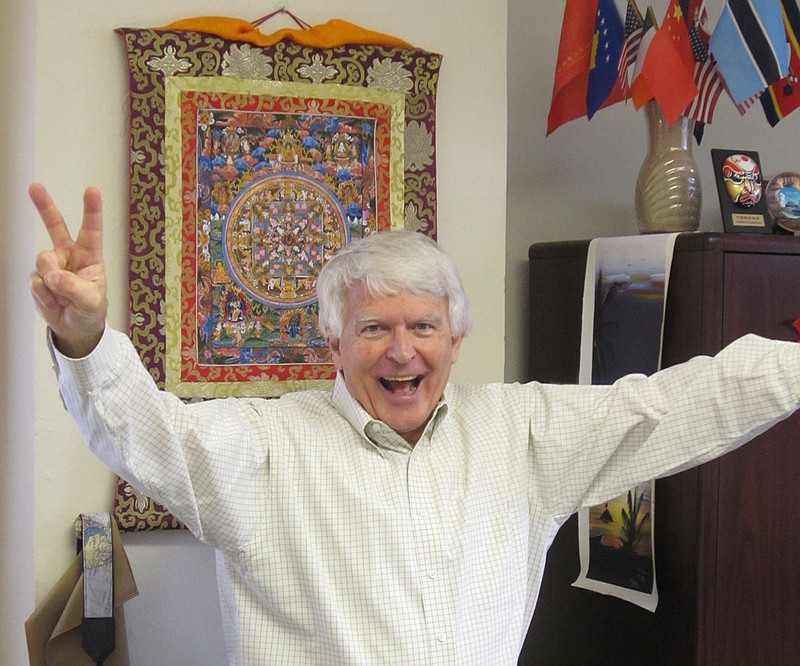In a small upstairs office filled with brightly colored treasures, the whirlwind of energy known as Pat Kirby is supposedly preparing for retirement after 40 years with Westminster College. Supposedly so because he remains busy making travel plans for his students, answering calls and figuring out how to make the transition of his post to his successor go smoothly.
"I've seen eight presidents pass through Westminster College," Kirby said. "And I've been lucky to have many supportive people who have been extremely helpful while I've been here."
Kirby's most recent position has been that of coordinator for international students, which he has held for the past eight years. But he has also held the positions of dean of Student Life, vice president and dean of Enrollment Services, and did a stint in the alumni offices.
But in spite of the good experiences he had in all those other positions, it has always been traveling and meeting new people that was dearest to his heart. That love was forged early on when in 1974 he accepted a position as director of Student Life by Chapman College of CA for their Semester at Sea program, which consisted of a sea voyage around South America, West Africa and the Mediterranean.
He credits that trip - reaching 12 countries and spending days at a time exploring port cities - as being the catalyst for his interest in international students and foreign countries.
"It was the best semester of my life," he said.
But having been a born Midwesterner, Kirby missed the change of seasons. In 1975, he applied for a position in his home-state of Iowa, but they didn't offer him the job. Instead they asked if he minded them sending his credentials to another school that had a position to fill.
The college was Westminster.
"The environment was pretty traditional after where I'd been," he said. "All white, male, preppy types. They were great kids, just not very diverse."
By 1979, the student population began to change, and the first break in policy was that of accepting young women to the college.
"One of the things I'm most proud of is being involved in the decision to go co-ed," said Kirby. "Having women on campus enriched the experience and made it more attractive to alumni. One of our alums had five daughters he sent to school here."
As the desire to be more diverse in their student body increased, Westminster also began recruiting students of color, both at home and internationally. When Kirby visited the University World Colleges - international schools for young people from areas of political unrest - in New Mexico and in Victoria BC, he said he was sold on international recruiting.
"I ended up having contacts everywhere. I usually stayed with families of students," said Kirby. "And after students got here, they usually encouraged me to go to the schools in their home countries, telling me about other students they knew."
He traveled to places as far flung as Mozambique, Nepal and Botswana. He traveled in Honduras, El Salvador and Guatemala. He never felt endangered or scared in any way, he said. But he always used good judgment when traveling, just as he would in US cities.
"I learned that humility is something we, in America, need more of," said Kirby. "As much as I love this country, we are not the only country with all the answers." He said he also learned to respect all religions, though he has never been a religious man himself. He grew to understand the breadth of belief systems that live together in the world.
"In Nepal, for example, you have people who are Hindu, Buddhists and Muslims. The schools observe holidays for all those religions, so you have to make sure you call a school to make sure it's open because it might be a holiday you don't know about."
Kirby enjoys telling his stories; his genuine affection for Westminster students is obvious.
"I'm not good at a lot of things. I'm not mechanical for example," he said gesturing toward his computer. "But I made a point when I was dean of Student Life to know every student's name by the start of classes."
He said it was something he worked hard at doing because taking the time to learn a student's name and a little bit about them made them feel like they were important.
"I told them if they stood up at orientation and I couldn't recall their names, I'd buy them a Coke," he said.
"And I didn't end up buying many Cokes," he added with a smile.

